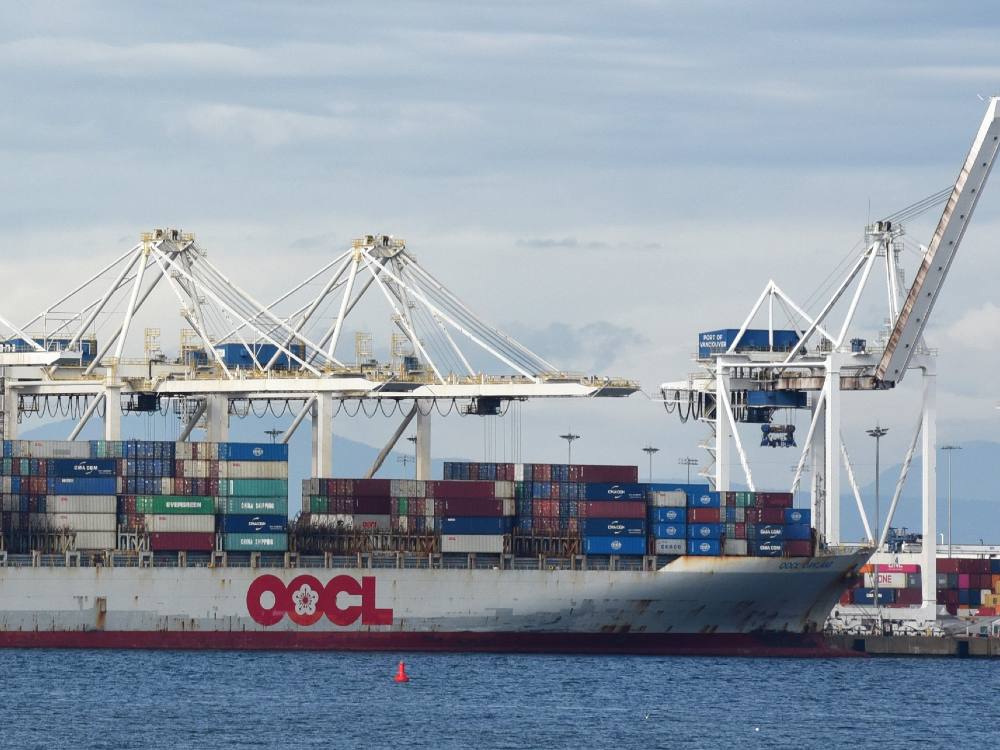Dan Alder spent his last moments at the top of a giant 56-metre-tall crane as co-workers and first responders rushed up and down a towering staircase trying to save his life.
Alder, a mechanic with Global Container Terminals Inc. at Deltaport, had climbed the gantry crane more than once that day before he suddenly collapsed on Dec. 14.
The first aid attendant, firefighters and paramedics all had to make the same climb to reach him. They raced up 23 flights up a metal switchback staircase in the precious minutes after he lost consciousness.
That’s because the elevator on “Crane 8” was broken that day — something Alder’s colleagues believe might have been the difference between life and death.
The Tyee has spoken to three sources at GCT’s Deltaport worksite who say workers routinely complained about frequent breakages of the elevators serving the port’s cranes, which are used to offload container vessels from around the world.
Lorne Stevens, the former third vice-president at the International Longshore & Warehouse Union Local 502, said the union had frequently warned about the danger a broken elevator would pose in a medical emergency, as the climb to the top would cost first responders valuable minutes and prevent colleagues from bringing a worker safely back down to the ground.
Stevens said he had told the company several times their rescue plan was inadequate in the event a worker at the top of the crane needed help. He said union members had filed numerous hazard reports about the broken elevators but that the problem continued.
He quit his position with the union shortly after Alder’s death.
“I felt I have been fighting for discrepancies and safeties with the company, with the union, and getting nowhere,” Stevens said. “And this fella that died on our crane was a friend of mine, somebody I worked with for 20 years. And it crushed me. It hurt me so bad I couldn’t save him. It was too much for me.”
The federal government’s Labour Program, responsible for safety on federally regulated workplaces like Deltaport, has launched an investigation into Alder’s death.
GCT, one of the largest container shipping operations in the country, said it has also launched an internal investigation. It did not answer questions about how often the elevators had broken down, how many reports they had received related to those cranes or whether they believe Alder’s death was preventable.
“We are unable to comment further at this time while the process is under way,” GCT spokesman Marko Dekovic said in an emailed statement.
ILWU Local 502 also did not respond to an interview request, including questions about how often its members had complained about the elevators.
But The Tyee spoke to two sources with knowledge of the matter who corroborated Stevens’ account. Those sources asked to not be named out of fear of reprisal.
The Tyee also obtained documentation showing a worker had complained about the broken elevator on Crane 8 as recently as November, about a month before Alder died.
“We’re hurt. There’s a lot of anger, because there’s been a lot of reports about these elevators, and working at these heights without elevators,” Stevens said.
“We dropped the ball on this one. Something needs to be done.”
Alder, 59, and a maintenance crew had been changing a trolley wheel at the top of Crane 8, one of a series of massive cranes used to offload container vessels from across the Pacific. The cranes reach out to the ships and can lift 65-tonne containers to the port on a manufactured island just north of the Tsawwassen ferry terminal.
Normally, sources said, the elevator on that crane takes roughly a minute to reach the top. But it was out of order that day, despite earlier indications from the company it would be working. That meant Alder’s colleagues couldn’t bring him to the ground when he suddenly collapsed.
Stevens said Alder’s colleagues began giving him chest compressions as an on-site first-aid attendant and another worker began sprinting up 23 flights of metal switchback stairs that lead to the top of the crane. Such a climb, one source said, takes at least six minutes for someone who is not carrying anything.
Local first responders say they received a 911 call at 1:10 p.m. Paramedics say the first ambulance reached the base of the crane by 1:19 p.m. but could not say how long it took them to climb to the top. Firefighters arrived at roughly 1:22 p.m.
Tim Ipsen, the deputy operations chief with Delta Fire & Emergency Services estimates it may have been between five and eight minutes for members to reach Alder.
Eventually, first responders realized they needed to transport Alder to the ground. “It was a bit of a treacherous, sketchy area,” Ipsen said. They placed Alder on a platform used for other maintenance work, then lowered him about 13 metres so he would be within range of a cherry picker mounted on the back of their firetruck, which they used to transport him to the waiting ambulance.
Alder died at the scene. Authorities have not given a cause of death.
There is no knowing if the outcome might have been different if first responders could have reached Alder quicker.
But Stevens believes the circumstances of his friend’s death cannot be ignored, especially as he says the union had repeatedly warned about the potential for such an accident because of frequent elevator breakdowns.
Crane 8, one source said, was manufactured by Shanghai Zhenhua Heavy Industries Company Ltd., a Chinese multinational corporation.
At one point, Stevens said members of ILWU Local 502 would service that crane, but that the responsibility was moved to a different group of workers.
When it broke down, Stevens said, the company would sometimes wait an extended time for parts to arrive before repairs could happen. On some occasions, the elevators would be out of service for days or weeks at a time.
This led to more than one emergency, he said. A few weeks before Alder’s death, Stevens said there was an incident where three workers were trapped in a crane elevator when it stopped functioning. They waited hours for the fire department to arrive.
“Sometimes people get trapped in the elevator. We’ve definitely had some medical emergencies and things like that,” Ipsen said. “I wouldn’t say it’s common, but nevertheless, definitely we’ve had many.”
On another occasion, a source said one of their colleagues had suffered a serious leg injury while working on top of the crane when the elevator was out of service; they were forced to hobble down the stairs with the help of another worker.
Those incidents led to “numerous” safety reports, Stevens said. Some specifically referenced the potential for disaster if a worker had a serious medical accident while on top of the crane, he said. Others noted the steep climb itself could be dangerous for workers, particularly if they were carrying heavy tools.
“Jobs up cranes require a route of egress in the event of a medical incident or a natural disaster… most likely threat being a workplace injury or medical event requiring immediate medical intervention,” reads the hazard complaint submitted by a worker about Crane 8 in early November.
Stevens said those issues were raised with GCT management but that the frequent breakages continued.
“I had told them several times that their rescue plan is inadequate if we do have a situation like this,” Stevens said.
The federal department Employment and Social Development Canada said it has investigated two other worker deaths at Deltaport in the past decade.
There is no timeline for the current investigation into Alder’s death, Employment and Social Development Canada said in a statement last week. That ministry’s Labour Program has the option of recommending criminal charges against an employer who violates federal law but provincial prosecutors make the final decision on whether to actually proceed.
GCT operates four terminals in Canada the United States. It announced a agreement to sell its American assets late last year for an undisclosed sum.
The company was once wholly owned by the Ontario Teachers’ Pension Plan, which still owns a 37.5 per cent stake in the company.
Its other major shareholders are IFM Investors, headquartered in Australia, and British Columbia Investment Management Corp., which invests on behalf of 11 public sector pension funds in B.C., including those for public school teachers and employees of WorkSafe BC.
Alder is remembered as an avid sportsman, loyal friend and talented mechanic who mentored a generation of workers on the docks.
Stevens said Alder was a member of the local’s hockey team and had played for much of his life. He was considered one of the most talented mechanics in a division of 200 people, Stevens said, and had even been tapped by the company to help develop work procedures.
The Tyee reached out to two members of Adler’s family before publication but did not hear back.
In a statement posted on its website, ILWU Local 502 said Alder would be remembered as a “well-known and respected member of our local and a mentor to everyone in the maintenance shop.”
Stevens said he is going public with his account because he wants someone to be held responsible for his friend’s death.
Another worker, who asked not to be named, said they dreaded the next time he would work atop a crane.
“Eventually, this is going to happen again to somebody,” they said. ![]()
Read more: Labour + Industry
















Tyee Commenting Guidelines
Comments that violate guidelines risk being deleted, and violations may result in a temporary or permanent user ban. Maintain the spirit of good conversation to stay in the discussion.
*Please note The Tyee is not a forum for spreading misinformation about COVID-19, denying its existence or minimizing its risk to public health.
Do:
Do not: